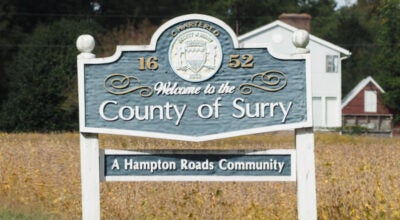Cypress Creek homeowners feud with developer over amenities
Published 4:18 pm Monday, September 9, 2024

- A circa-2017 concept plan for Cypress Creek Phase Six showed an enclosed pool and hot tub area with bocce ball courts, barbecue areas and a walking trail buffered by numerous trees. The Cypress Creek Homeowners Association contends the hot tub, bocce ball courts, barbecue areas were never provided, and far fewer trees have been planted as the development nears completion. (Image courtesy of Cypress Creek Homeowners Association)
The Cypress Creek Homeowners Association claims the subdivision’s developer hasn’t delivered on amenities or met deadlines promised as conditions of approval to build Cypress Creek’s sixth and final phase.
The developer, however, claims the HOA is part of the reason for the delay.
HOA Vice President Russ MacConnell, during the public comment period at the Sept. 3 meeting of Smithfield’s Town Council, produced a circa-2017 conceptual plan for 152 Phase Six houses intended to complete the 450-home development that’s been built in phases since 1986 around the Cypress Creek Golfers Club.
The plan showed a community fitness center surrounded by a fenced in-ground pool, hot tub, bocce ball courts, a barbecue area and an adjacent walking trail buffered by more than 20 trees leading up to a scenic overlook at Cypress Creek. Virginia Beach-based Robinson Development Group, the developer of Phase Six, had as of 2020 proffered that a pool and fitness facility “as outlined on the conceptual plan” was to be built and conveyed to the HOA no later than the 55th certificate of occupancy issued by Isle of Wight County for Phase Six, and that the walking trail too was to be constructed “as outlined on the conceptual plan” and turned over to the HOA by the 108th certificate of occupancy.
But what’s been built to date is a far cry from the 2017 plan, MacConnell contends.
“In the transition from the conceptual plan to the site plan, the developer reduced the size of the fence, reduced the number of trees from a total of 43 to six, deleted three barbecue areas, deleted two bocce ball courts, deleted the spa, and removed all the benches and trees from the walking trail. None of this was made known to the Homeowners Association until we dug into it,” MacConnell told council members.
According to MacConnell, the fitness center should have received its certificate of occupancy in September of last year, but didn’t receive it until nine months later in June, and as of the Sept. 3 meeting hadn’t been conveyed to the HOA.
The result of the delays and deletions, MacConnell said, is “29 homes now back up to a 10-acre cow pasture with a 3-foot-wide asphalt walking trail instead of having benches and trees to break it up.”
According to Town Attorney Bill Riddick, proffers are legally binding.
“If their proffers said that it would be developed in conformity with the conceptual plan and it shows that stuff, they’ve got to put it in,” Riddick said.
The town, Riddick said, has several avenues of recourse it can use should a developer not adhere to proffers, including withholding permits or the refunding of the developer’s bond. Developers in Smithfield must set aside 20% of the value of what they propose to build, which is refunded to the developer upon satisfactory completion of the subdivision agreement.
Town Councilman Randy Pack said Phase Six was approved for “cluster” suburban residential zoning, which allows houses to be built closer together than the maximum density for typical developments.
“In exchange for that density we got this big 10 acres here and it is pretty with the trees and the path to that, but as described as a ‘cow pasture’ that’s not maintained and doesn’t have the trees, it loses its appeal, so those are things that we need to stay on top of,” Pack said.
Part of the difficulty in staying on top of a developer’s adherence to its proffers, according to Town Manager Michael Stallings, is that the building inspection process that precedes the issuance of certificates of occupancy is handled by Isle of Wight County, while the town only oversees the site plan process.
Tim Culpepper, senior vice president of Robinson Development Group, contends it’s the HOA that’s holding up the transfer of ownership of the fitness center.
He told The Smithfield Times two days after the meeting that when Robinson sent the HOA the deed, its leadership, rather than signing the document, “came back with a list of demands” and “instructions from an attorney” that the HOA wouldn’t sign off on the transfer of ownership until those demands were met.
“The issue could be resolved by them signing the deed. … The HOA board has put us in an unfortunate position in not allowing that to happen,” Culpepper said.
Culpepper acknowledged some elements shown on what he called the “preliminary” 2017 conceptual plan had changed to accommodate more detailed plans drawn by engineers to account for stormwater infrastructure.
“There were a number of things from the conceptual plan that were revised from the final engineered plan. It’s not uncommon,” Culpepper said.
Culpepper contends the HOA was provided a copy of the final engineered plan in 2021.
Prior to the current conflict over the fitness center and pool, “I’ve had a good working relationship with the HOA,” Culpepper said.
Culpepper said he couldn’t estimate how many of the Phase Six homes had been built to date, as Robinson sells individual lots to builders, who are then responsible for getting building permits and handling the certificate of occupancy inspection. All Phase Six lots have been sold, he said.
Isle of Wight County, according to Assistant County Administrator Don Robertson, has issued certificates of occupancy for 120 Phase Six residences, surpassing the 55th and 108th certificate thresholds specified in the development’s proffers.
Tammie Clary, director of community development and planning for Smithfield, confirmed Culpepper’s assertion that the HOA was “refusing acceptance” of the deed for the pool and fitness center.





